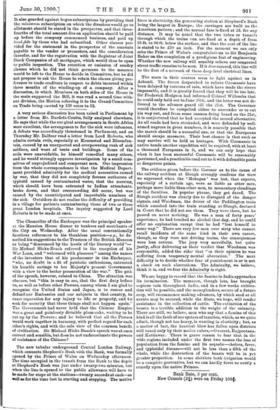We are happy to record that the famine in India
approaches its termination. The monsoon, though late, has brought copious rain throughout India, and in a few weeks cultiva- tion will be possible, and the moneylenders, secure of a future crop, will recommence making advances, by which seed at all events may be secured, while the State, we hope, will render assistance in the collection of cattle. The extinction of the beasts is a terrible addition to the weight of the calamity. There are still, we believe, men who say that a famine of this kind is all the fault of our system of taxation, which, as we quite admit, though not too heavy, is wanting in elasticity ; but, as a matter of fact, the heaviest blow has fallen upon districts still taxed only by their native rulers,—Guzera.t, Rajpootana, and Kattiawar. There is grave reason to fear that in the wide regions included under the first two names the loss of population from the famine and its sequela3—cholera, fever, and typhoidal disease—will not be less than a fifth of the whole, while the destruction of the beasts will be in yet greater proportion. In some districts tank irrigation would be a complete preventive, but we can hardly force so costly a remedy upon the native Princes.


















































 Previous page
Previous page